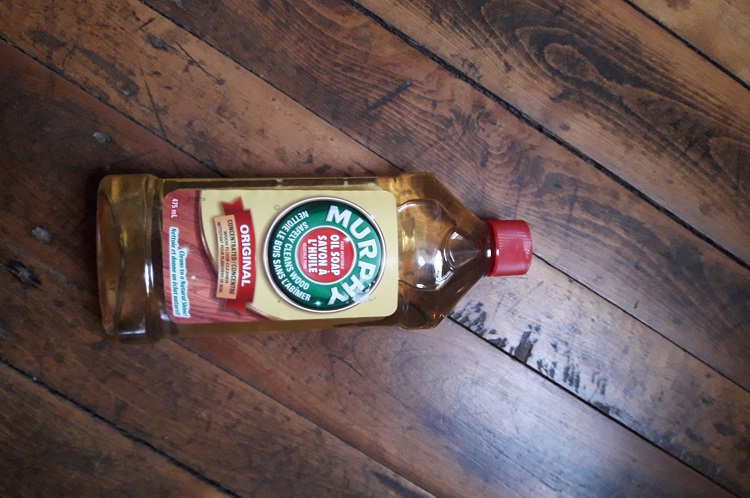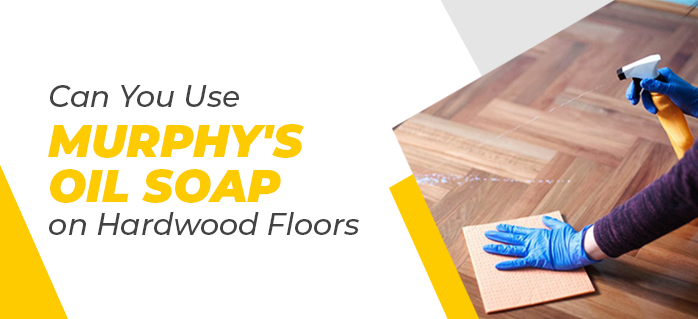Laminate floors are a popular choice for homeowners thanks to their affordability, durability, and ease of maintenance. But when it comes to cleaning, many people wonder about the safety and effectiveness of using Murphy’s Oil Soap. After all, it’s a classic product for cleaning wood floors, but is it suitable for laminate?

Image: livingpristine.com
The answer, like many things in the world of cleaning, is not straightforward. While Murphy’s Oil Soap is generally considered safe for laminate floors, there are nuances to keep in mind that can affect whether or not it’s the best option for your particular cleaning routine.
Understanding Laminate Flooring
Before diving into the specifics of Murphy’s Oil Soap, it’s crucial to understand the nature of laminate flooring itself. Unlike actual hardwood, laminate is a composite material. It’s made of a core layer of compressed wood fibers, which is topped with a printed image that mimics the look of various wood types. This image is then protected by a wear layer, typically made of a durable resin like melamine or acrylic.
This protective wear layer is key to the durability and longevity of laminate flooring. It resists scratches, stains, and fading, making it a practical choice for high-traffic areas. However, it also means that laminate floors are not porous like hardwood, so they don’t need the same kind of oil-based treatments.
Is Murphy’s Oil Soap Appropriate for Laminate?
Now, to the heart of the matter. While Murphy’s Oil Soap is not designed for laminate, it’s generally safe to use in a diluted solution for cleaning your floors. The soap’s gentle formula is less likely to damage the wear layer, but it’s important to remember that it’s not intended to be an oil-based finish like you might apply to hardwood floors.
Why You Might Consider Murphy’s Oil Soap for Laminate
- Gentle Cleaning: Murphy’s Oil Soap is known for its mild cleaning properties, which can be helpful in removing dirt, dust, and light grime without stripping away the protective wear layer of your laminate flooring.
- Pleasant Scent: The classic, nostalgic scent of Murphy’s Oil Soap can add a refreshingly clean aroma to your home.
- Versatile Cleaner: Many people already have Murphy’s Oil Soap on hand, making it a convenient option for both laminate and other surfaces.

Image: almahdihardwoodflooring.com
Why You Might Want to Avoid Murphy’s Oil Soap for Laminate
- Not a Finish: Murphy’s Oil Soap won’t provide any added protection or shine to your laminate floors like it would to hardwood. If you’re looking for a product that can enhance the appearance of your laminate, you might need to consider other options.
- Potential for Streaking: If you don’t use Murphy’s Oil Soap properly, it can leave streaks, especially on darker laminate floors.
- Not as Effective for Stubborn Stains: Murphy’s Oil Soap is best suited for light cleaning and may not be powerful enough to remove stubborn stains like ink or paint.
Alternatives to Murphy’s Oil Soap
If you’re not sure about using Murphy’s Oil Soap on your laminate floors or want to explore other options, here are some alternatives:
- Dedicated Laminate Floor Cleaners: There are several commercial cleaners specifically designed for laminate flooring. These cleaners are formulated to effectively remove dirt and grime without harming the wear layer.
- White Vinegar: A mixture of equal parts water and white vinegar is a natural, effective, and budget-friendly cleaner for laminate floors. Be sure to test it on a small, inconspicuous area first to see how your flooring reacts.
- Mild Dish Soap: A diluted solution of mild dish soap in warm water can also be used to clean laminate floors. Rinse thoroughly and avoid excessive scrubbing to protect the wear layer.
Proper Cleaning Techniques for Laminate Floors
Regardless of the cleaning product you choose, it’s important to use proper cleaning techniques to maintain the beauty and durability of your laminate floors:
- Always Start with Sweeping or Vacuuming: Remove loose dirt and debris before mopping or cleaning.
- Dilute Solutions: Use a mild cleaning solution and always dilute it according to the manufacturer’s instructions.
- Damp Cleaning: Avoid oversaturating your laminate floors with water. Simply dampen your mop or cleaning cloth.
- Rinse Thoroughly: Always rinse your floors well after cleaning to remove any residue that could attract dirt and dull the finish.
- Dry Immediately: Dry your laminate floors as quickly as possible with a soft towel or microfiber cloth to prevent water damage.
- Avoid Abrasive Cleaners: Harsh chemicals, abrasive cleaners, and even some polishes can damage the wear layer of your laminate flooring.
Maintaining Your Laminate Floors for Longevity
Regular cleaning is key to keeping your laminate floors looking their best. Here are some additional tips for maintaining your laminate floors:
- Use Protective Mats: Place mats or rugs at entry points to help prevent dirt and debris from being tracked onto your floors.
- Address Spills Immediately: Clean up spills as quickly as possible to prevent stains and damage.
- Use Furniture Pads: Protect your floors from scratches by placing felt pads or furniture protectors under furniture legs.
- Avoid Harsh Chemicals: Do not use harsh chemicals, such as bleach or ammonia-based cleaners, on your laminate floors. These can damage the surface and may even void your warranty.
Can I Use Murphy’S Oil Soap On My Laminate Floors
Conclusion
While Murphy’s Oil Soap can be a safe option for cleaning laminate floors, it’s best to use it in a diluted form and avoid using it frequently. Consider dedicated laminate floor cleaners or natural alternatives like white vinegar and mild dish soap for more effective cleaning. Remember to always follow proper cleaning techniques to maintain the beauty and lifespan of your laminate floors.





